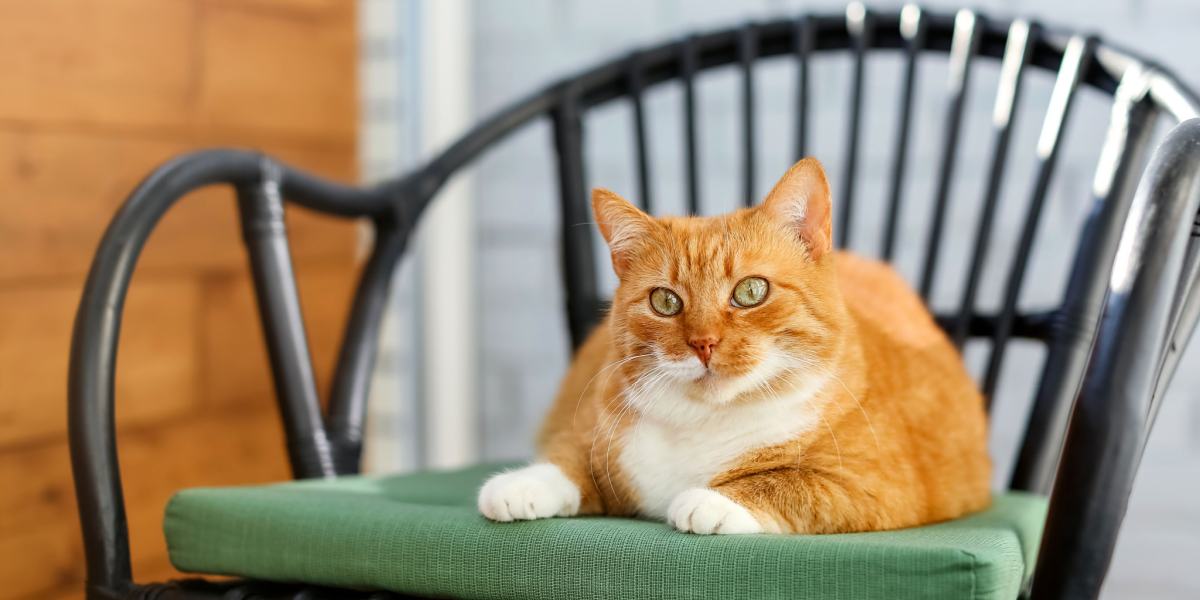
Cat owners the world over will be familiar with the scenario: you’re sitting on your favorite chair when you get up momentarily to fetch something, and immediately your cat jumps up and steals your seat.
Happily set up in their new spot, they curl up, get comfortable, and settle down, purring, to take one of their many daytime naps. They might even be there for hours!
So, why is it that when you get up, your cat just has to take your spot, even if their hugely comfortable (and expensive!) cat bed is right nearby?
Let’s have a look at some of the reasons why our cats steal our seats without guilt or shame— the answers may make you more tolerant of this aggravating behavior!
They Love Warmth!
Our domestic cats originated as wild cats, found in the African savannahs, and despite this being many, many generations ago, most cats still love warm places. Think of the usual cat haunts: sunny spots, curled up near heaters, under a blanket in a cozy bed … and of course, anywhere that has been nicely warmed up by your body heat.
The body temperature of a cat drops when they sleep, as the body shuts down non-vital functions, and cats naturally gravitate toward a warm sleeping area to counteract this. Cats have very sensitive paws, which can sense temperature changes and easily detect warm areas, and they are always quick to take advantage of a cozy place to nap.
The Comforting Smell
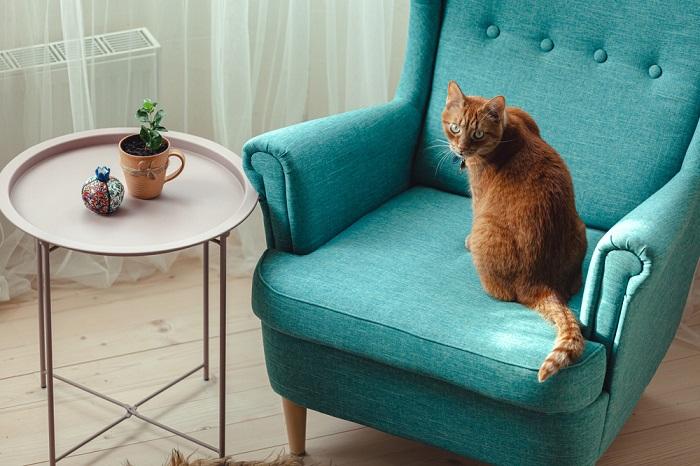
When your cat steals your seat, part of the draw is the warmth from your body and the comfort of your smell.
Cats have an excellent sense of smell, much better than ours. For example, cats can sniff out catnip from the other side of the house!
Smell plays a huge role in cat behavior and well-being. Cats use scents to alert them to danger and to reassure them of safety. They also use chemical signals called pheromones, alongside body language and posture, as one of their main forms of communication.
Cats love to layer smells up. By sitting in your chair after you have been using it, they are combing their scent with that of the pet owners. Cats see themselves as part of your family group, and this mixing of smells is comforting and reassuring for them.
Cats are always on the lookout for good ways to share scents around, and when you get up, they know that your favorite chair will be infused with your cat’s favorite smell: you. It gets even better if you return and have a cuddle with them! This is also why you might find your house cat purring away on your side of the bed in the middle of the night—don’t you just love cats?
Safety
Cats are wary creatures, with strong survival instincts. When a cat sleeps, they are at their most vulnerable. Therefore, they like to pick nice safe places to take their naps. Our human chairs are raised off the ground, and often are protected on three sides by the tall back and arms, so they offer more protection than a standard cat bed placed on the floor.
Cats can curl up in a chair and still have a good view of the room and feel that they are in a strong vantage position. Cats are also cunning: They see you looking relaxed and happy in your favorite chair and realize that this is an excellent place to have a cat sleep too—and they are perfectly happy to take it from you!
Territory
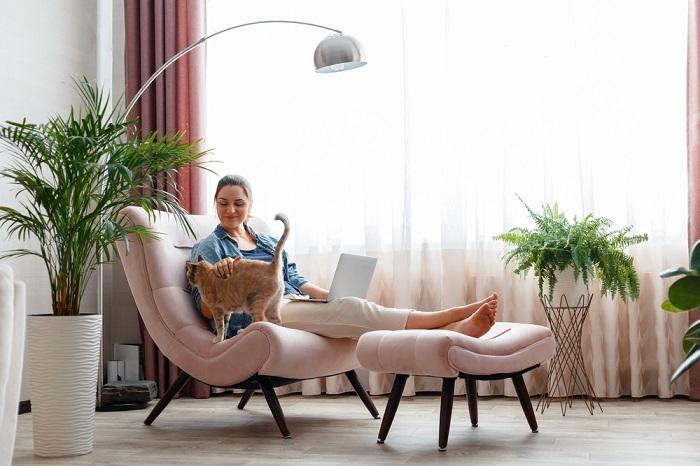
When your cat sees you sitting in a comfortable place, they like to take advantage of your great choice.
Cats are highly territorial. Feral cats have a peripheral territory, which is where they patrol and hunt, and which is often highly contested by nearby rivals. Cats also have a core territory, where they sleep and eat. House cats may well have smaller territories, and often no peripheral territory at all, but they still use pheromone scent communication to mark out their key areas.
Pet owners consider their cats to be part of the family, and the reverse is also true, so cats use pheromones to mark their owners and their owners’ favorite spaces as “safe.” This is why they often rub their head against you, or weave through your legs, using pheromones released from their face to mark you as part of their bonded gang.
Pheromones fade over time and need constant reapplication. When you get up from your chair, your cat may seize the opportunity to rub themselves over your territory, leaving scent marks to communicate to themselves and their group that this is a desirable and safe area.
Attention-Seeking
If you’ve heard the phrase “any news is good news,” it can equally apply to cats and the reactions they get from owners. If your cat loves attention, they quickly learn what gets it for them—even if the reaction is negative.
Stealing your spot may result in you paying them attention: a cuddle, an attempted distraction with a toy, perhaps even some cat food! Even just picking up your cat to move them is considered contact, at least.
This is often seen in those more high-maintenance cats (like mine!): they follow you about constantly, have loud meows when ignored, and may even jump on my head if not responded to quickly enough!
How Do I Stop My Cat From Taking My Seat?
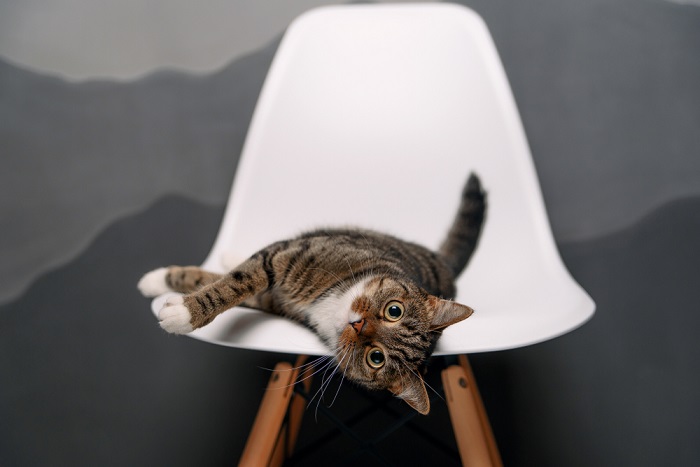
It isn’t always easy to claim back your seat from a determined cat, but there are a few things you can try.
Now we know why cats perform this somewhat annoying behavior, can we stop them? Well, this can be tricky. It is perfectly normal cat behavior to steal our seat when we get up—they are attracted to the warmth, the safety, and the smells and pheromones associated with these warm spots.
If this is becoming aggravating for you, try making a bed for them that is nearby to you, warm it up (use a heating pad to warm the bed, but don’t allow your cat to contact it directly to avoid burns), and place an article of clothing in it that smells like you. Reward your cat when they use this bed, and if it ticks all their boxes, they might well take to it.
Otherwise, enjoy the strange quirks of our feline friends, indulge in a cuddle, and relax knowing that your cat is paying you a compliment when they boldly settle down into their stolen seat!
Also Read: The 8 Best Cat Trees Of 2022
Frequently Asked Questions
What does it mean when a cat takes your seat?
When a cat steals your seat, they are usually taking advantage of the warmth you leave behind when you’ve been sitting on it. They may also be attracted to the comforting smells and feeling of safety that your chair gives them.
Why does my cat take my spot?
Your spot will be warm and smell like you, which is very attractive to cats. They may also be marking your spot with their pheromones, and scent signals that communicate to your cat that you are part of their bonded group.
Why does my cat steal my things?
If your cat is bonded to you, they may well be attracted to objects that smell like you, as this will be comforting to your cat. They may also be doing this to get a reaction—cats love the attention!
Why does my cat lay in my spot on the bed?
Your place on the bed will be warm and smell like you—two things that your cat loves. Your cat will also be mingling your scent with theirs, which is an important part of cat behavior with bonded family members.

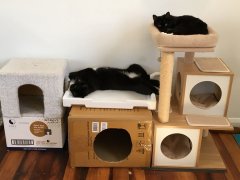



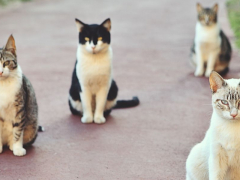
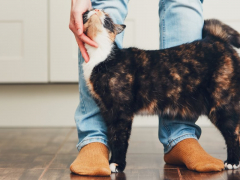
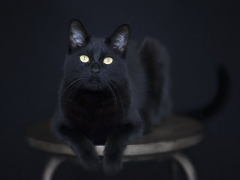
I was at a new friends house and had met their cat for like 5 min and got up and returned to find their cat in my seat. Cats are interesting creatures.